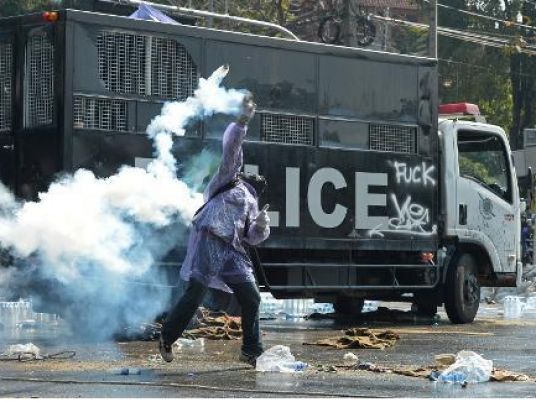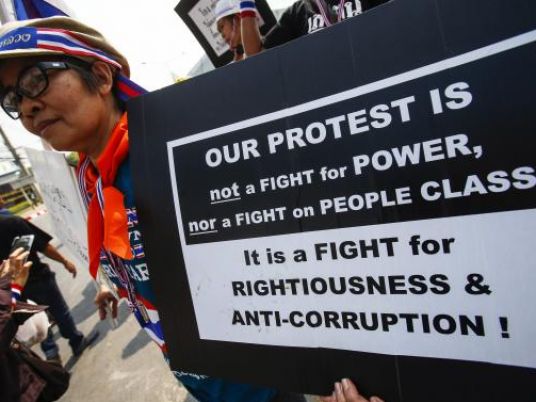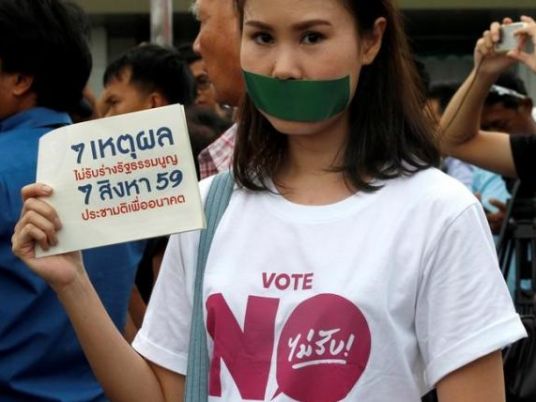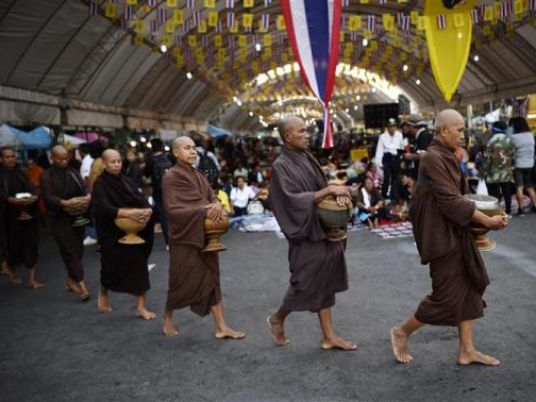
Thai Prime Minister Yingluck Shinawatra rejected protester demands to suspend the country's democratic system and indicated she would not resign Monday amid rolling clashes between security forces and demonstrators bent on toppling her government.
Police used rubber bullets, tear gas and water cannon against rock-throwing demonstrators as they intensified their defence of key government buildings after weekend unrest in the capital left several dead and over a hundred wounded.
The protests, aimed at unseating the elected government and replacing it with a "people's council", are the latest outbreak of civil strife to rock the kingdom since royalist generals ousted Thaksin Shinawatra, Yingluck's brother, seven years ago.
Bloodshed in the capital in recent days is the worst political violence in Thailand since a deadly 2010 military crackdown on pro-Thaksin "Red Shirts".
In her first televised address since the weeks-long protests descended into violence late Saturday, Yingluck said she could not accede to the demands of the protest leaders because they would breach the country's laws.
"Anything I can do to make people happy, I am willing to do… but as prime minister, what I can do must be under the constitution," she said, adding that she did not "cling to power".
The embattled premier said she would have considered resigning or calling an election if protesters had not already ruled out these moves as insufficient, insisting the government was open to "every option" to restore peace.
Protesters, led by former opposition MP Suthep Thaugsuban, on Sunday issued an ultimatum for Yingluck's government to be ousted and hand power "to the people" in a secret meeting with Yingluck in the presence of army, navy and air force commanders.
"There will be no bargaining and it must be finished in two days," said Suthep after the talks.
The demonstrators have rejected elections and said they want to root out the "Thaksin regime", in reference to the former premier who is widely seen as the power behind Yingluck's government.
Thaksin, a billionaire tycoon-turned-politician, is hated by the elites, Bangkok's middle class and southerners, who have massed in the capital in recent days and accuse the ousted leader of corruption and threatening the monarchy.
But he is adored by many outside Bangkok, particularly in his stronghold in the nation's north, which has helped him and his allies win every election for a decade.
Yingluck, whose ruling party stormed to power on a wave of Thaksin support at elections in 2011, on Monday said any solution to the crisis would have to be "acceptable to the majority".
The Thai leader has kept a low profile during the unrest, a move some analysts read as an attempt to avoid further inflaming the protesters.
But officials confirmed increased use of force on Monday as protests intensified.
"There are rubber bullets used today," Paradorn Pattanatabut, Secretary General of the National Security Council told AFP on telephone.
"The protesters seemed to get more violent," he said, adding that tear gas had not been sufficient.
Police are trying to defend barriers at the prime minister's offices and Metropolitan Police headquarters against protesters who have besieged several key ministries.
Television footage appeared to show a heavy lifting vehicle being driven from one of the protesters' bases close to Government House, where police have deployed concrete blocks to hold off demonstrators.
Some schools and universities in the capital were closed for safety reasons, authorities said.
While the protesters' numbers have fallen since an estimated 180,000 people joined an opposition rally on November 24, they have besieged high-profile targets including ministries in what some observers believe is an attempt to provoke a military coup.
Thailand has seen 18 actual or attempted coups since 1932, most recently with Thaksin's overthrow in 2006, but the military has appeared reluctant to intervene in the current standoff.
Thailand is due to celebrate the birthday of King Bhumibol Adulyadej on Thursday in a public holiday that is normally embraced in a spirit of calm and reverence for the ageing monarch.
The weekend's violence broke out Saturday near a suburban stadium where tens of thousands of pro-government "Red Shirts" had gathered in support of Yingluck.
Several were killed and dozens wounded, according to Bangkok's Erawan emergency centre.
Authorities have deployed more than 2,700 troops to reinforce security in Bangkok, the first time a significant number of soldiers has been mobilised to cope with the recent unrest.
The protests were triggered by an amnesty bill, since abandoned by the ruling party, which opponents feared would have allowed Thaksin to return to the country.



